Corporations Law Assignment - Business Incorporation & Agency Issues
VerifiedAdded on 2023/01/20
|10
|2392
|35
Homework Assignment
AI Summary
This corporations law assignment addresses two key scenarios. The first involves Michael, a sole trader restaurant owner, considering incorporating his business with the help of his sons. The assignment explores the steps involved in incorporation, the benefits (limited liability, tax advantages, capital raising) and disadvantages (costs, ongoing expenses) of forming a company, and Michael's concerns about control and ownership. The second scenario examines an agency relationship between Golden Gate Technologies (GGT) Ltd and its salesman, George, who offers an unauthorized discount to a potential client, Poolsworth Ltd. The assignment analyzes express authority, the limits of George's authority, and the potential for ratification of the deal by GGT. It provides legal advice to Poolsworth Ltd, emphasizing that the manager's approval is needed for the discount.
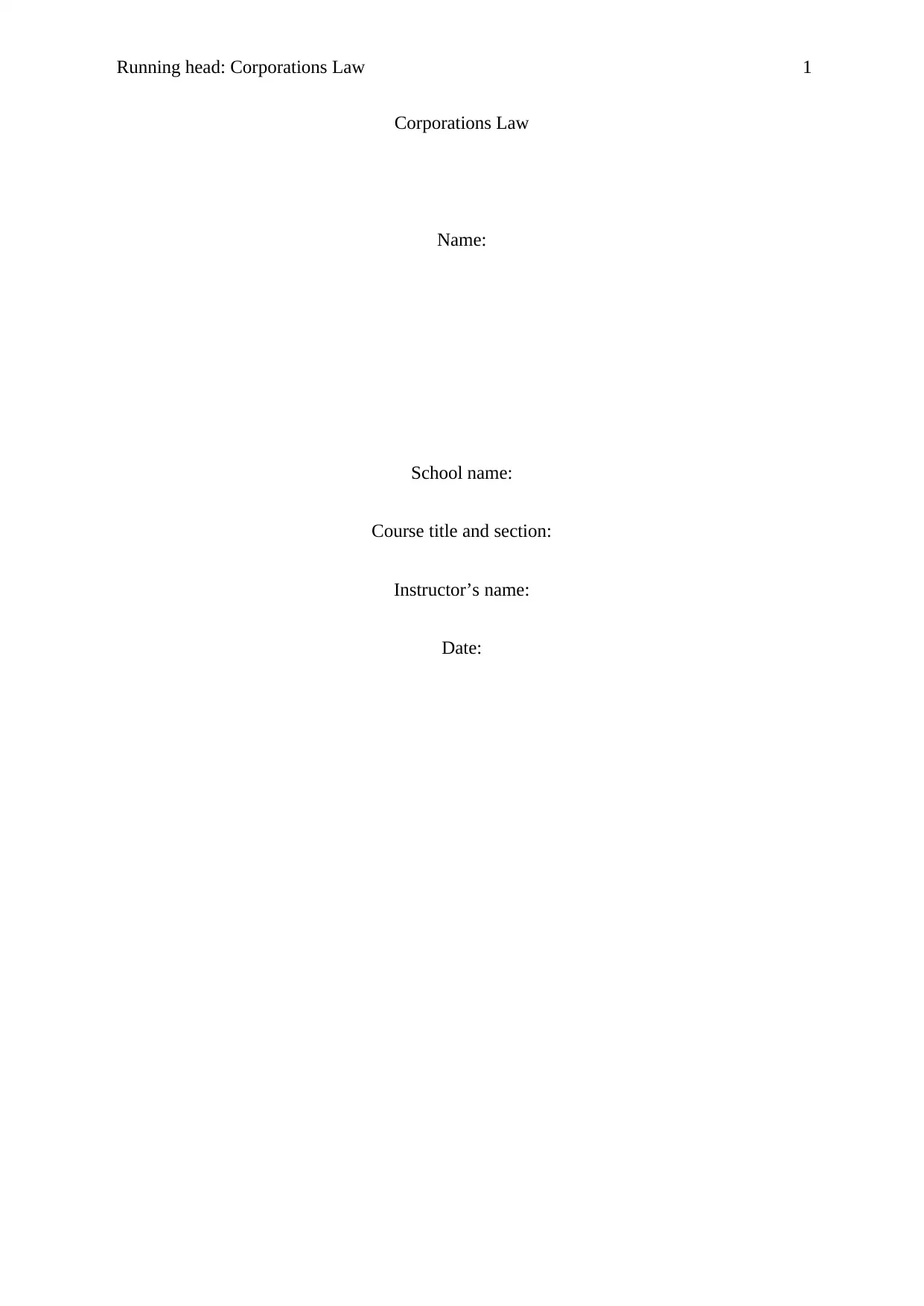
Running head: Corporations Law 1
Corporations Law
Name:
School name:
Course title and section:
Instructor’s name:
Date:
Corporations Law
Name:
School name:
Course title and section:
Instructor’s name:
Date:
Paraphrase This Document
Need a fresh take? Get an instant paraphrase of this document with our AI Paraphraser
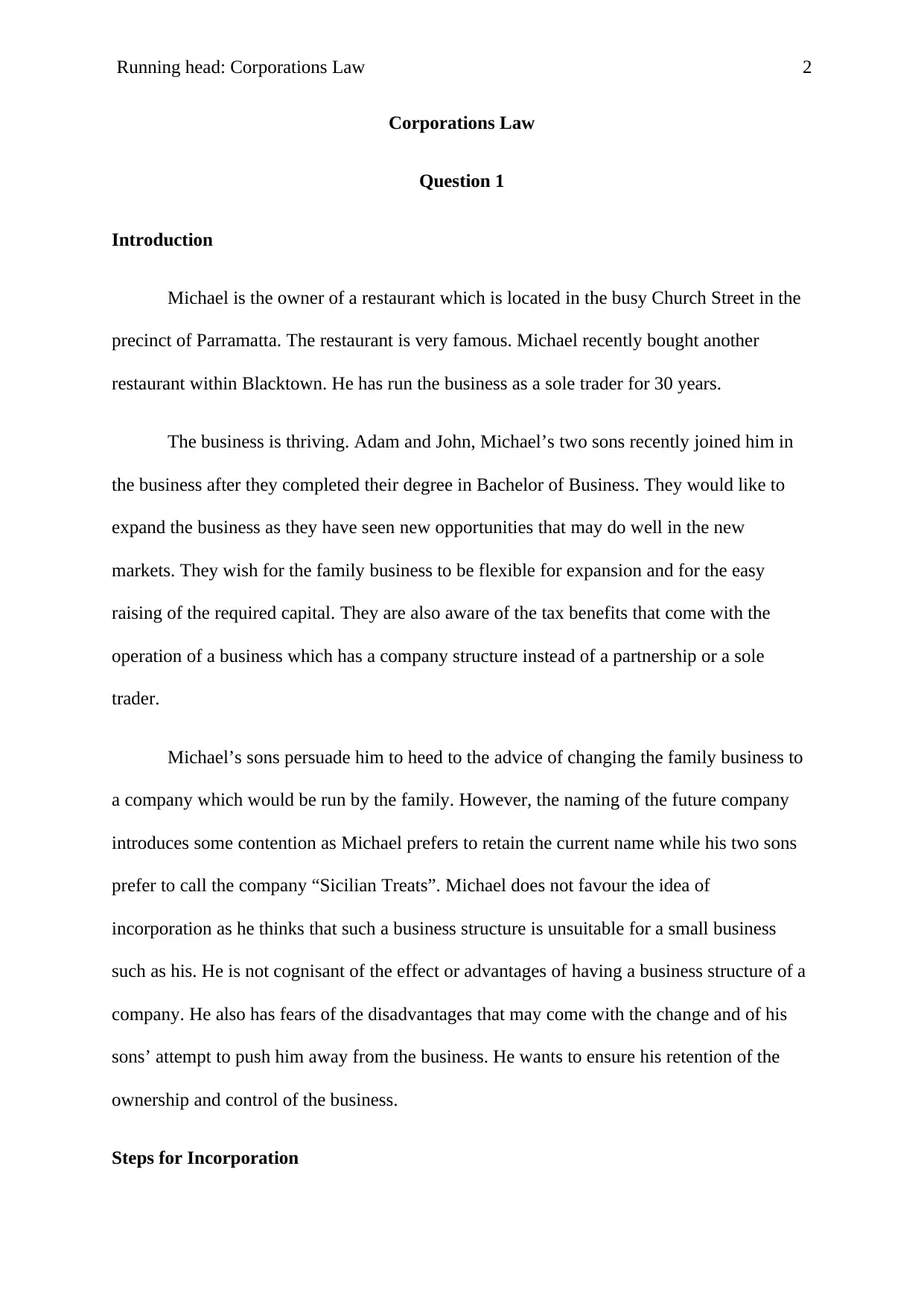
Running head: Corporations Law 2
Corporations Law
Question 1
Introduction
Michael is the owner of a restaurant which is located in the busy Church Street in the
precinct of Parramatta. The restaurant is very famous. Michael recently bought another
restaurant within Blacktown. He has run the business as a sole trader for 30 years.
The business is thriving. Adam and John, Michael’s two sons recently joined him in
the business after they completed their degree in Bachelor of Business. They would like to
expand the business as they have seen new opportunities that may do well in the new
markets. They wish for the family business to be flexible for expansion and for the easy
raising of the required capital. They are also aware of the tax benefits that come with the
operation of a business which has a company structure instead of a partnership or a sole
trader.
Michael’s sons persuade him to heed to the advice of changing the family business to
a company which would be run by the family. However, the naming of the future company
introduces some contention as Michael prefers to retain the current name while his two sons
prefer to call the company “Sicilian Treats”. Michael does not favour the idea of
incorporation as he thinks that such a business structure is unsuitable for a small business
such as his. He is not cognisant of the effect or advantages of having a business structure of a
company. He also has fears of the disadvantages that may come with the change and of his
sons’ attempt to push him away from the business. He wants to ensure his retention of the
ownership and control of the business.
Steps for Incorporation
Corporations Law
Question 1
Introduction
Michael is the owner of a restaurant which is located in the busy Church Street in the
precinct of Parramatta. The restaurant is very famous. Michael recently bought another
restaurant within Blacktown. He has run the business as a sole trader for 30 years.
The business is thriving. Adam and John, Michael’s two sons recently joined him in
the business after they completed their degree in Bachelor of Business. They would like to
expand the business as they have seen new opportunities that may do well in the new
markets. They wish for the family business to be flexible for expansion and for the easy
raising of the required capital. They are also aware of the tax benefits that come with the
operation of a business which has a company structure instead of a partnership or a sole
trader.
Michael’s sons persuade him to heed to the advice of changing the family business to
a company which would be run by the family. However, the naming of the future company
introduces some contention as Michael prefers to retain the current name while his two sons
prefer to call the company “Sicilian Treats”. Michael does not favour the idea of
incorporation as he thinks that such a business structure is unsuitable for a small business
such as his. He is not cognisant of the effect or advantages of having a business structure of a
company. He also has fears of the disadvantages that may come with the change and of his
sons’ attempt to push him away from the business. He wants to ensure his retention of the
ownership and control of the business.
Steps for Incorporation
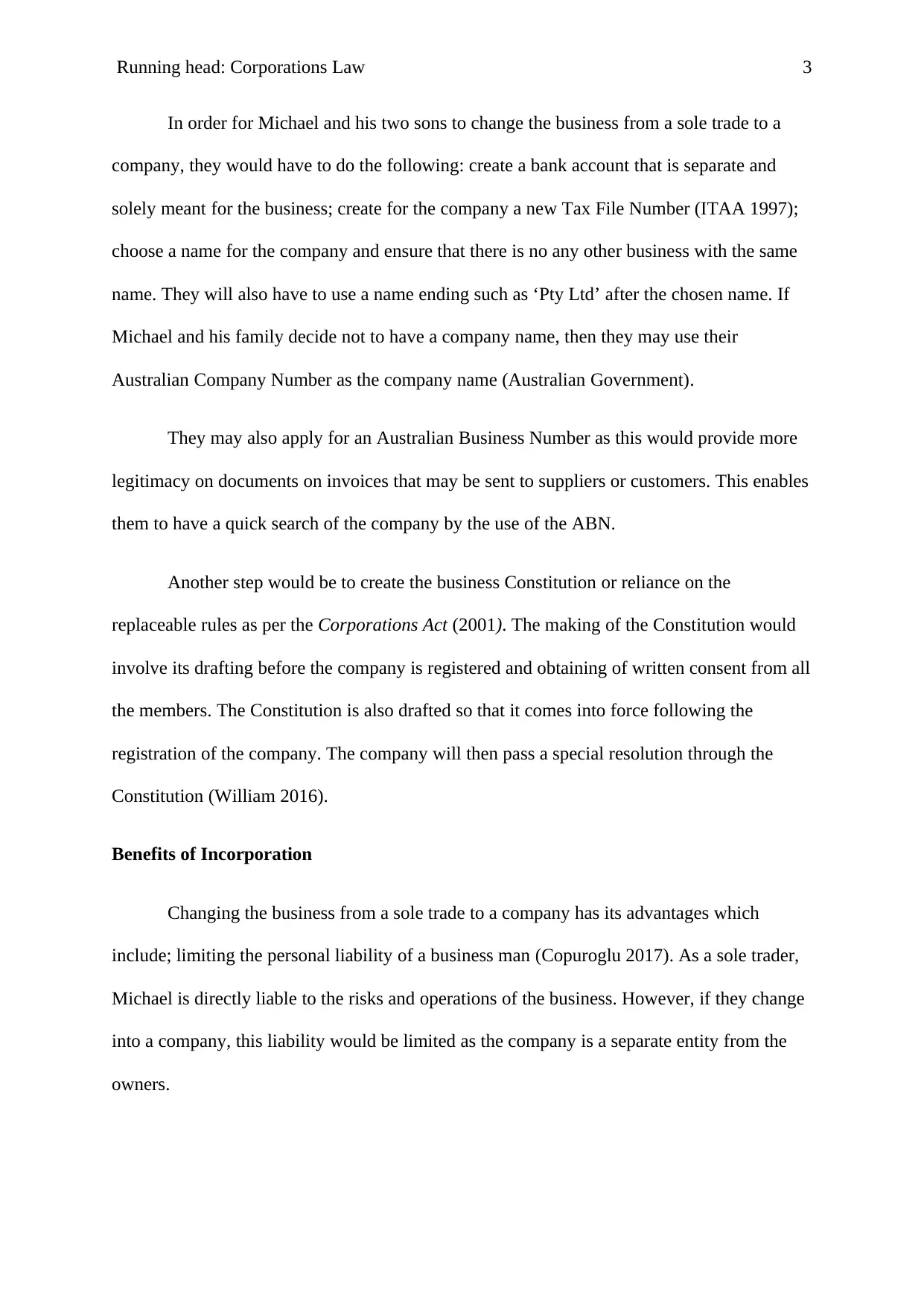
Running head: Corporations Law 3
In order for Michael and his two sons to change the business from a sole trade to a
company, they would have to do the following: create a bank account that is separate and
solely meant for the business; create for the company a new Tax File Number (ITAA 1997);
choose a name for the company and ensure that there is no any other business with the same
name. They will also have to use a name ending such as ‘Pty Ltd’ after the chosen name. If
Michael and his family decide not to have a company name, then they may use their
Australian Company Number as the company name (Australian Government).
They may also apply for an Australian Business Number as this would provide more
legitimacy on documents on invoices that may be sent to suppliers or customers. This enables
them to have a quick search of the company by the use of the ABN.
Another step would be to create the business Constitution or reliance on the
replaceable rules as per the Corporations Act (2001). The making of the Constitution would
involve its drafting before the company is registered and obtaining of written consent from all
the members. The Constitution is also drafted so that it comes into force following the
registration of the company. The company will then pass a special resolution through the
Constitution (William 2016).
Benefits of Incorporation
Changing the business from a sole trade to a company has its advantages which
include; limiting the personal liability of a business man (Copuroglu 2017). As a sole trader,
Michael is directly liable to the risks and operations of the business. However, if they change
into a company, this liability would be limited as the company is a separate entity from the
owners.
In order for Michael and his two sons to change the business from a sole trade to a
company, they would have to do the following: create a bank account that is separate and
solely meant for the business; create for the company a new Tax File Number (ITAA 1997);
choose a name for the company and ensure that there is no any other business with the same
name. They will also have to use a name ending such as ‘Pty Ltd’ after the chosen name. If
Michael and his family decide not to have a company name, then they may use their
Australian Company Number as the company name (Australian Government).
They may also apply for an Australian Business Number as this would provide more
legitimacy on documents on invoices that may be sent to suppliers or customers. This enables
them to have a quick search of the company by the use of the ABN.
Another step would be to create the business Constitution or reliance on the
replaceable rules as per the Corporations Act (2001). The making of the Constitution would
involve its drafting before the company is registered and obtaining of written consent from all
the members. The Constitution is also drafted so that it comes into force following the
registration of the company. The company will then pass a special resolution through the
Constitution (William 2016).
Benefits of Incorporation
Changing the business from a sole trade to a company has its advantages which
include; limiting the personal liability of a business man (Copuroglu 2017). As a sole trader,
Michael is directly liable to the risks and operations of the business. However, if they change
into a company, this liability would be limited as the company is a separate entity from the
owners.
⊘ This is a preview!⊘
Do you want full access?
Subscribe today to unlock all pages.

Trusted by 1+ million students worldwide
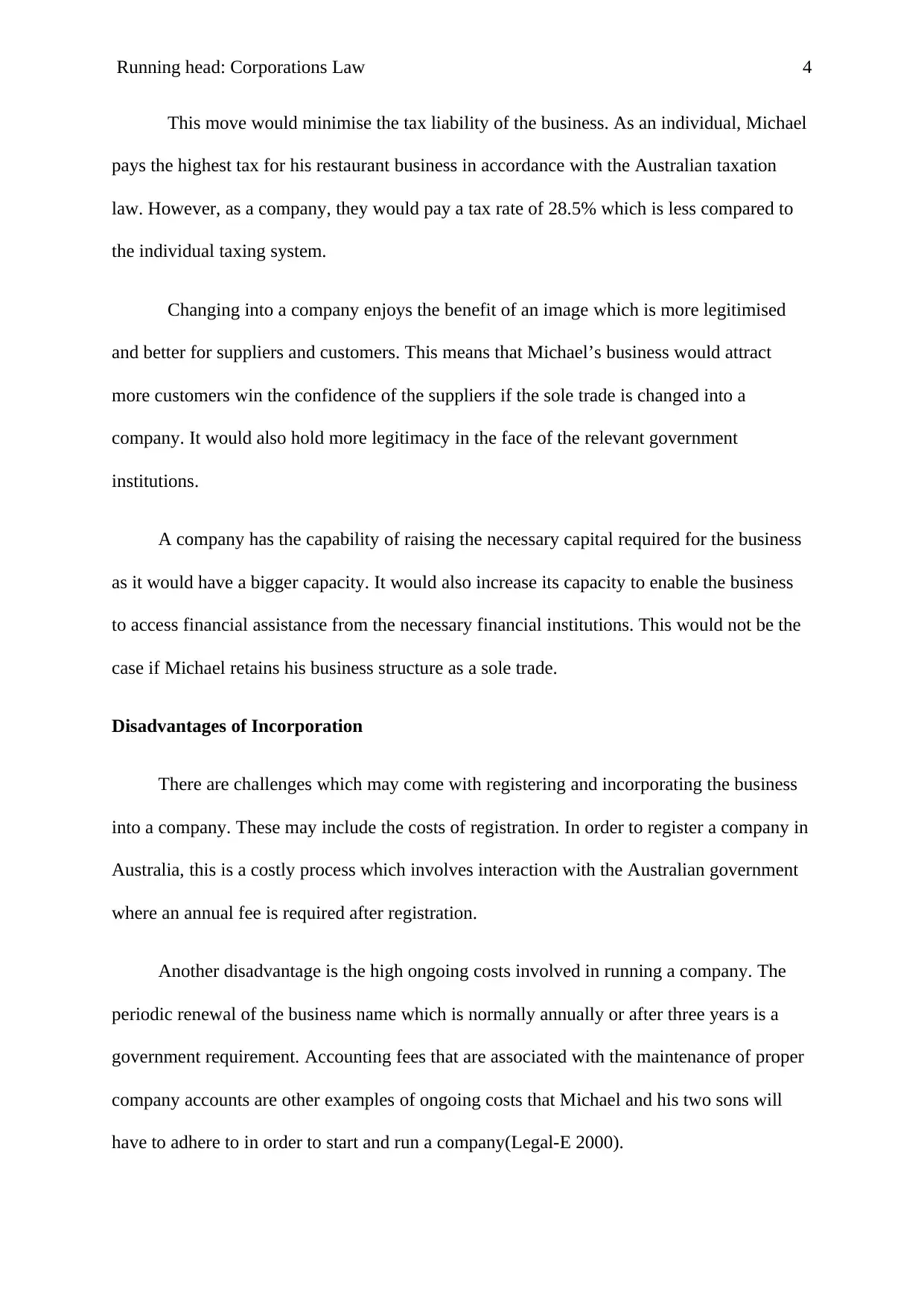
Running head: Corporations Law 4
This move would minimise the tax liability of the business. As an individual, Michael
pays the highest tax for his restaurant business in accordance with the Australian taxation
law. However, as a company, they would pay a tax rate of 28.5% which is less compared to
the individual taxing system.
Changing into a company enjoys the benefit of an image which is more legitimised
and better for suppliers and customers. This means that Michael’s business would attract
more customers win the confidence of the suppliers if the sole trade is changed into a
company. It would also hold more legitimacy in the face of the relevant government
institutions.
A company has the capability of raising the necessary capital required for the business
as it would have a bigger capacity. It would also increase its capacity to enable the business
to access financial assistance from the necessary financial institutions. This would not be the
case if Michael retains his business structure as a sole trade.
Disadvantages of Incorporation
There are challenges which may come with registering and incorporating the business
into a company. These may include the costs of registration. In order to register a company in
Australia, this is a costly process which involves interaction with the Australian government
where an annual fee is required after registration.
Another disadvantage is the high ongoing costs involved in running a company. The
periodic renewal of the business name which is normally annually or after three years is a
government requirement. Accounting fees that are associated with the maintenance of proper
company accounts are other examples of ongoing costs that Michael and his two sons will
have to adhere to in order to start and run a company(Legal-E 2000).
This move would minimise the tax liability of the business. As an individual, Michael
pays the highest tax for his restaurant business in accordance with the Australian taxation
law. However, as a company, they would pay a tax rate of 28.5% which is less compared to
the individual taxing system.
Changing into a company enjoys the benefit of an image which is more legitimised
and better for suppliers and customers. This means that Michael’s business would attract
more customers win the confidence of the suppliers if the sole trade is changed into a
company. It would also hold more legitimacy in the face of the relevant government
institutions.
A company has the capability of raising the necessary capital required for the business
as it would have a bigger capacity. It would also increase its capacity to enable the business
to access financial assistance from the necessary financial institutions. This would not be the
case if Michael retains his business structure as a sole trade.
Disadvantages of Incorporation
There are challenges which may come with registering and incorporating the business
into a company. These may include the costs of registration. In order to register a company in
Australia, this is a costly process which involves interaction with the Australian government
where an annual fee is required after registration.
Another disadvantage is the high ongoing costs involved in running a company. The
periodic renewal of the business name which is normally annually or after three years is a
government requirement. Accounting fees that are associated with the maintenance of proper
company accounts are other examples of ongoing costs that Michael and his two sons will
have to adhere to in order to start and run a company(Legal-E 2000).
Paraphrase This Document
Need a fresh take? Get an instant paraphrase of this document with our AI Paraphraser
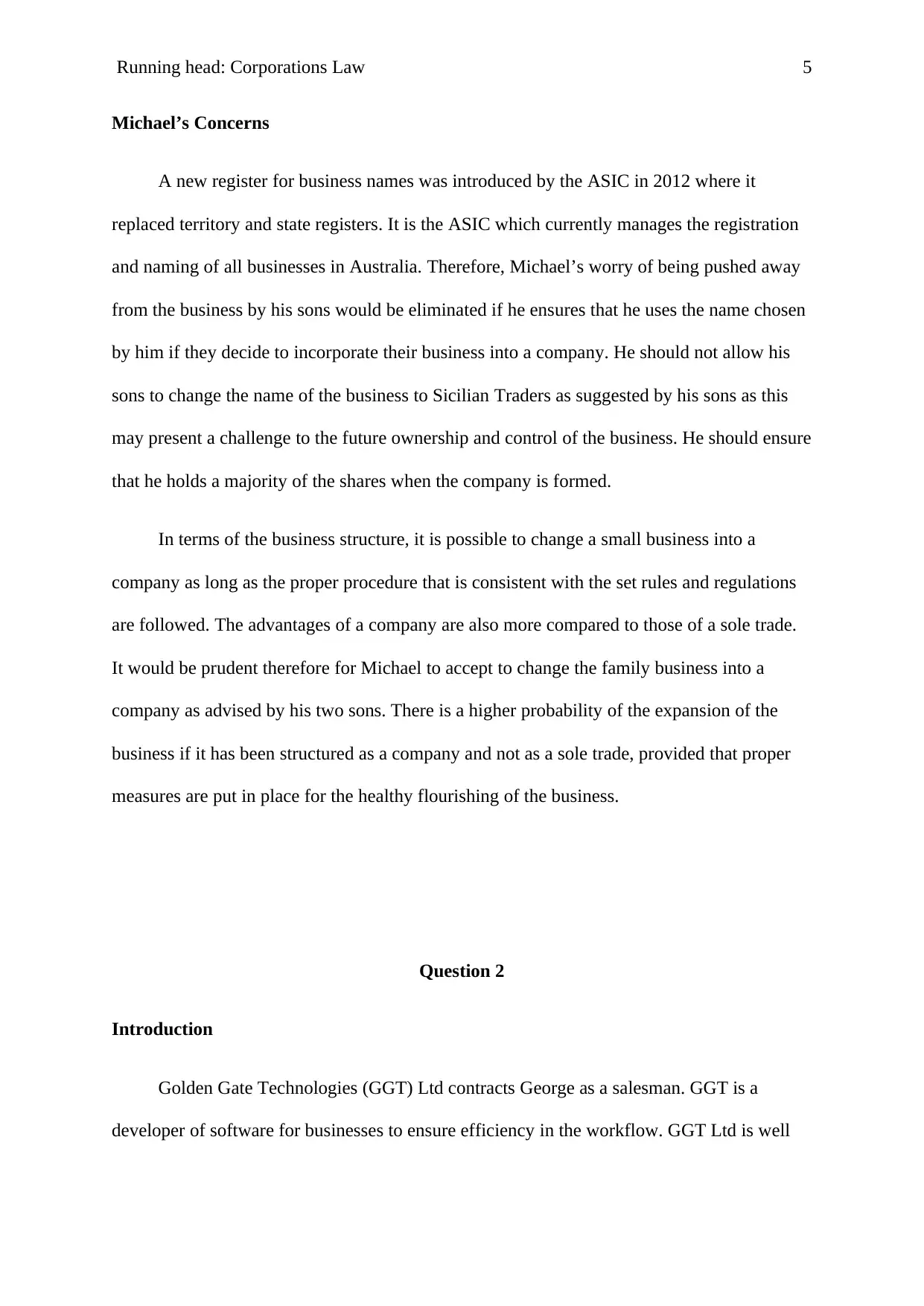
Running head: Corporations Law 5
Michael’s Concerns
A new register for business names was introduced by the ASIC in 2012 where it
replaced territory and state registers. It is the ASIC which currently manages the registration
and naming of all businesses in Australia. Therefore, Michael’s worry of being pushed away
from the business by his sons would be eliminated if he ensures that he uses the name chosen
by him if they decide to incorporate their business into a company. He should not allow his
sons to change the name of the business to Sicilian Traders as suggested by his sons as this
may present a challenge to the future ownership and control of the business. He should ensure
that he holds a majority of the shares when the company is formed.
In terms of the business structure, it is possible to change a small business into a
company as long as the proper procedure that is consistent with the set rules and regulations
are followed. The advantages of a company are also more compared to those of a sole trade.
It would be prudent therefore for Michael to accept to change the family business into a
company as advised by his two sons. There is a higher probability of the expansion of the
business if it has been structured as a company and not as a sole trade, provided that proper
measures are put in place for the healthy flourishing of the business.
Question 2
Introduction
Golden Gate Technologies (GGT) Ltd contracts George as a salesman. GGT is a
developer of software for businesses to ensure efficiency in the workflow. GGT Ltd is well
Michael’s Concerns
A new register for business names was introduced by the ASIC in 2012 where it
replaced territory and state registers. It is the ASIC which currently manages the registration
and naming of all businesses in Australia. Therefore, Michael’s worry of being pushed away
from the business by his sons would be eliminated if he ensures that he uses the name chosen
by him if they decide to incorporate their business into a company. He should not allow his
sons to change the name of the business to Sicilian Traders as suggested by his sons as this
may present a challenge to the future ownership and control of the business. He should ensure
that he holds a majority of the shares when the company is formed.
In terms of the business structure, it is possible to change a small business into a
company as long as the proper procedure that is consistent with the set rules and regulations
are followed. The advantages of a company are also more compared to those of a sole trade.
It would be prudent therefore for Michael to accept to change the family business into a
company as advised by his two sons. There is a higher probability of the expansion of the
business if it has been structured as a company and not as a sole trade, provided that proper
measures are put in place for the healthy flourishing of the business.
Question 2
Introduction
Golden Gate Technologies (GGT) Ltd contracts George as a salesman. GGT is a
developer of software for businesses to ensure efficiency in the workflow. GGT Ltd is well
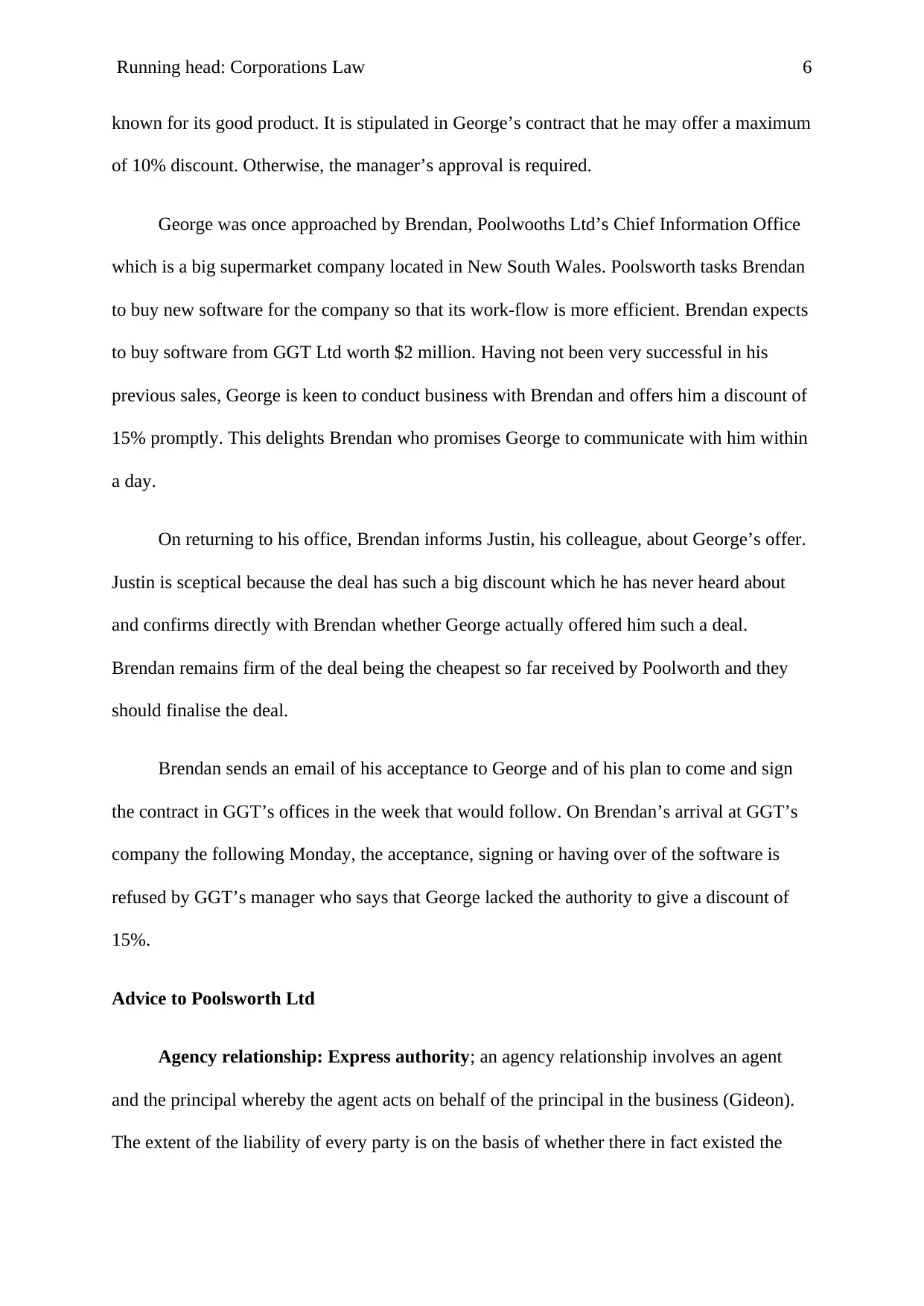
Running head: Corporations Law 6
known for its good product. It is stipulated in George’s contract that he may offer a maximum
of 10% discount. Otherwise, the manager’s approval is required.
George was once approached by Brendan, Poolwooths Ltd’s Chief Information Office
which is a big supermarket company located in New South Wales. Poolsworth tasks Brendan
to buy new software for the company so that its work-flow is more efficient. Brendan expects
to buy software from GGT Ltd worth $2 million. Having not been very successful in his
previous sales, George is keen to conduct business with Brendan and offers him a discount of
15% promptly. This delights Brendan who promises George to communicate with him within
a day.
On returning to his office, Brendan informs Justin, his colleague, about George’s offer.
Justin is sceptical because the deal has such a big discount which he has never heard about
and confirms directly with Brendan whether George actually offered him such a deal.
Brendan remains firm of the deal being the cheapest so far received by Poolworth and they
should finalise the deal.
Brendan sends an email of his acceptance to George and of his plan to come and sign
the contract in GGT’s offices in the week that would follow. On Brendan’s arrival at GGT’s
company the following Monday, the acceptance, signing or having over of the software is
refused by GGT’s manager who says that George lacked the authority to give a discount of
15%.
Advice to Poolsworth Ltd
Agency relationship: Express authority; an agency relationship involves an agent
and the principal whereby the agent acts on behalf of the principal in the business (Gideon).
The extent of the liability of every party is on the basis of whether there in fact existed the
known for its good product. It is stipulated in George’s contract that he may offer a maximum
of 10% discount. Otherwise, the manager’s approval is required.
George was once approached by Brendan, Poolwooths Ltd’s Chief Information Office
which is a big supermarket company located in New South Wales. Poolsworth tasks Brendan
to buy new software for the company so that its work-flow is more efficient. Brendan expects
to buy software from GGT Ltd worth $2 million. Having not been very successful in his
previous sales, George is keen to conduct business with Brendan and offers him a discount of
15% promptly. This delights Brendan who promises George to communicate with him within
a day.
On returning to his office, Brendan informs Justin, his colleague, about George’s offer.
Justin is sceptical because the deal has such a big discount which he has never heard about
and confirms directly with Brendan whether George actually offered him such a deal.
Brendan remains firm of the deal being the cheapest so far received by Poolworth and they
should finalise the deal.
Brendan sends an email of his acceptance to George and of his plan to come and sign
the contract in GGT’s offices in the week that would follow. On Brendan’s arrival at GGT’s
company the following Monday, the acceptance, signing or having over of the software is
refused by GGT’s manager who says that George lacked the authority to give a discount of
15%.
Advice to Poolsworth Ltd
Agency relationship: Express authority; an agency relationship involves an agent
and the principal whereby the agent acts on behalf of the principal in the business (Gideon).
The extent of the liability of every party is on the basis of whether there in fact existed the
⊘ This is a preview!⊘
Do you want full access?
Subscribe today to unlock all pages.

Trusted by 1+ million students worldwide
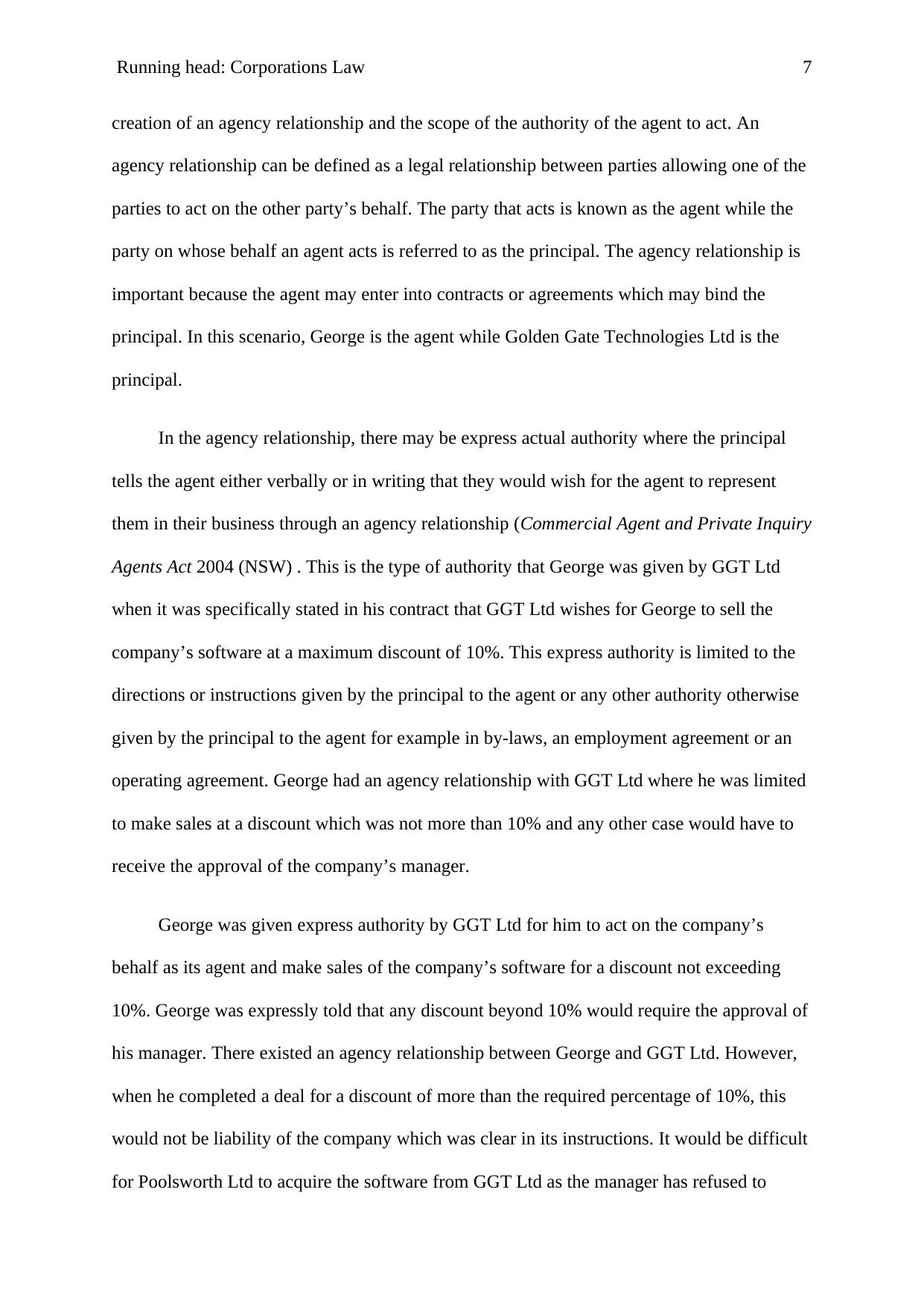
Running head: Corporations Law 7
creation of an agency relationship and the scope of the authority of the agent to act. An
agency relationship can be defined as a legal relationship between parties allowing one of the
parties to act on the other party’s behalf. The party that acts is known as the agent while the
party on whose behalf an agent acts is referred to as the principal. The agency relationship is
important because the agent may enter into contracts or agreements which may bind the
principal. In this scenario, George is the agent while Golden Gate Technologies Ltd is the
principal.
In the agency relationship, there may be express actual authority where the principal
tells the agent either verbally or in writing that they would wish for the agent to represent
them in their business through an agency relationship (Commercial Agent and Private Inquiry
Agents Act 2004 (NSW) . This is the type of authority that George was given by GGT Ltd
when it was specifically stated in his contract that GGT Ltd wishes for George to sell the
company’s software at a maximum discount of 10%. This express authority is limited to the
directions or instructions given by the principal to the agent or any other authority otherwise
given by the principal to the agent for example in by-laws, an employment agreement or an
operating agreement. George had an agency relationship with GGT Ltd where he was limited
to make sales at a discount which was not more than 10% and any other case would have to
receive the approval of the company’s manager.
George was given express authority by GGT Ltd for him to act on the company’s
behalf as its agent and make sales of the company’s software for a discount not exceeding
10%. George was expressly told that any discount beyond 10% would require the approval of
his manager. There existed an agency relationship between George and GGT Ltd. However,
when he completed a deal for a discount of more than the required percentage of 10%, this
would not be liability of the company which was clear in its instructions. It would be difficult
for Poolsworth Ltd to acquire the software from GGT Ltd as the manager has refused to
creation of an agency relationship and the scope of the authority of the agent to act. An
agency relationship can be defined as a legal relationship between parties allowing one of the
parties to act on the other party’s behalf. The party that acts is known as the agent while the
party on whose behalf an agent acts is referred to as the principal. The agency relationship is
important because the agent may enter into contracts or agreements which may bind the
principal. In this scenario, George is the agent while Golden Gate Technologies Ltd is the
principal.
In the agency relationship, there may be express actual authority where the principal
tells the agent either verbally or in writing that they would wish for the agent to represent
them in their business through an agency relationship (Commercial Agent and Private Inquiry
Agents Act 2004 (NSW) . This is the type of authority that George was given by GGT Ltd
when it was specifically stated in his contract that GGT Ltd wishes for George to sell the
company’s software at a maximum discount of 10%. This express authority is limited to the
directions or instructions given by the principal to the agent or any other authority otherwise
given by the principal to the agent for example in by-laws, an employment agreement or an
operating agreement. George had an agency relationship with GGT Ltd where he was limited
to make sales at a discount which was not more than 10% and any other case would have to
receive the approval of the company’s manager.
George was given express authority by GGT Ltd for him to act on the company’s
behalf as its agent and make sales of the company’s software for a discount not exceeding
10%. George was expressly told that any discount beyond 10% would require the approval of
his manager. There existed an agency relationship between George and GGT Ltd. However,
when he completed a deal for a discount of more than the required percentage of 10%, this
would not be liability of the company which was clear in its instructions. It would be difficult
for Poolsworth Ltd to acquire the software from GGT Ltd as the manager has refused to
Paraphrase This Document
Need a fresh take? Get an instant paraphrase of this document with our AI Paraphraser
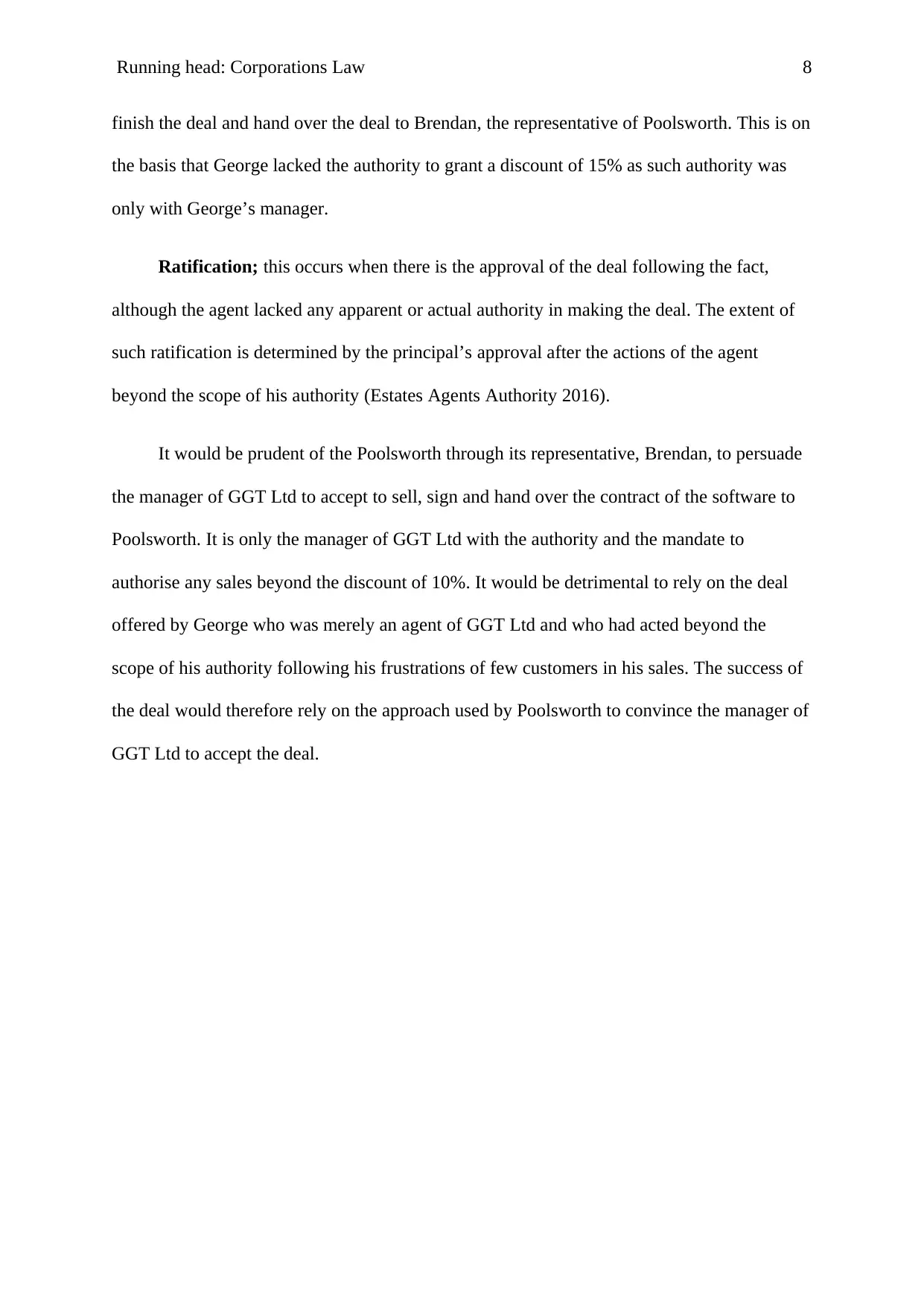
Running head: Corporations Law 8
finish the deal and hand over the deal to Brendan, the representative of Poolsworth. This is on
the basis that George lacked the authority to grant a discount of 15% as such authority was
only with George’s manager.
Ratification; this occurs when there is the approval of the deal following the fact,
although the agent lacked any apparent or actual authority in making the deal. The extent of
such ratification is determined by the principal’s approval after the actions of the agent
beyond the scope of his authority (Estates Agents Authority 2016).
It would be prudent of the Poolsworth through its representative, Brendan, to persuade
the manager of GGT Ltd to accept to sell, sign and hand over the contract of the software to
Poolsworth. It is only the manager of GGT Ltd with the authority and the mandate to
authorise any sales beyond the discount of 10%. It would be detrimental to rely on the deal
offered by George who was merely an agent of GGT Ltd and who had acted beyond the
scope of his authority following his frustrations of few customers in his sales. The success of
the deal would therefore rely on the approach used by Poolsworth to convince the manager of
GGT Ltd to accept the deal.
finish the deal and hand over the deal to Brendan, the representative of Poolsworth. This is on
the basis that George lacked the authority to grant a discount of 15% as such authority was
only with George’s manager.
Ratification; this occurs when there is the approval of the deal following the fact,
although the agent lacked any apparent or actual authority in making the deal. The extent of
such ratification is determined by the principal’s approval after the actions of the agent
beyond the scope of his authority (Estates Agents Authority 2016).
It would be prudent of the Poolsworth through its representative, Brendan, to persuade
the manager of GGT Ltd to accept to sell, sign and hand over the contract of the software to
Poolsworth. It is only the manager of GGT Ltd with the authority and the mandate to
authorise any sales beyond the discount of 10%. It would be detrimental to rely on the deal
offered by George who was merely an agent of GGT Ltd and who had acted beyond the
scope of his authority following his frustrations of few customers in his sales. The success of
the deal would therefore rely on the approach used by Poolsworth to convince the manager of
GGT Ltd to accept the deal.
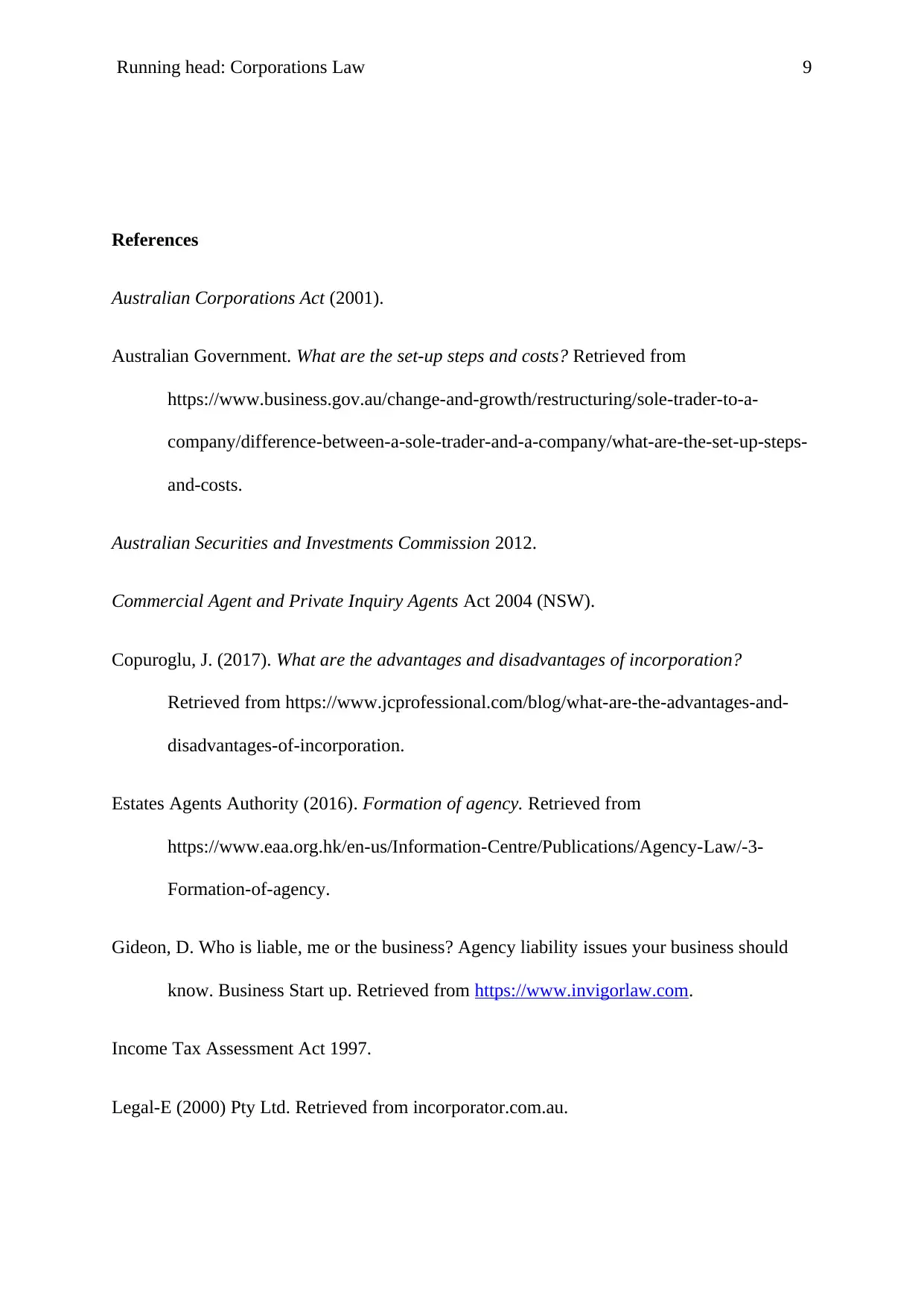
Running head: Corporations Law 9
References
Australian Corporations Act (2001).
Australian Government. What are the set-up steps and costs? Retrieved from
https://www.business.gov.au/change-and-growth/restructuring/sole-trader-to-a-
company/difference-between-a-sole-trader-and-a-company/what-are-the-set-up-steps-
and-costs.
Australian Securities and Investments Commission 2012.
Commercial Agent and Private Inquiry Agents Act 2004 (NSW).
Copuroglu, J. (2017). What are the advantages and disadvantages of incorporation?
Retrieved from https://www.jcprofessional.com/blog/what-are-the-advantages-and-
disadvantages-of-incorporation.
Estates Agents Authority (2016). Formation of agency. Retrieved from
https://www.eaa.org.hk/en-us/Information-Centre/Publications/Agency-Law/-3-
Formation-of-agency.
Gideon, D. Who is liable, me or the business? Agency liability issues your business should
know. Business Start up. Retrieved from https://www.invigorlaw.com.
Income Tax Assessment Act 1997.
Legal-E (2000) Pty Ltd. Retrieved from incorporator.com.au.
References
Australian Corporations Act (2001).
Australian Government. What are the set-up steps and costs? Retrieved from
https://www.business.gov.au/change-and-growth/restructuring/sole-trader-to-a-
company/difference-between-a-sole-trader-and-a-company/what-are-the-set-up-steps-
and-costs.
Australian Securities and Investments Commission 2012.
Commercial Agent and Private Inquiry Agents Act 2004 (NSW).
Copuroglu, J. (2017). What are the advantages and disadvantages of incorporation?
Retrieved from https://www.jcprofessional.com/blog/what-are-the-advantages-and-
disadvantages-of-incorporation.
Estates Agents Authority (2016). Formation of agency. Retrieved from
https://www.eaa.org.hk/en-us/Information-Centre/Publications/Agency-Law/-3-
Formation-of-agency.
Gideon, D. Who is liable, me or the business? Agency liability issues your business should
know. Business Start up. Retrieved from https://www.invigorlaw.com.
Income Tax Assessment Act 1997.
Legal-E (2000) Pty Ltd. Retrieved from incorporator.com.au.
⊘ This is a preview!⊘
Do you want full access?
Subscribe today to unlock all pages.

Trusted by 1+ million students worldwide

Running head: Corporations Law
10
William, V. (2016). How to change from a sole trader to a company. Lawpath. Retrieved
from https://lawpath.com.au/blog/how-to-change-from-a-sole-trader-to-a-company.
10
William, V. (2016). How to change from a sole trader to a company. Lawpath. Retrieved
from https://lawpath.com.au/blog/how-to-change-from-a-sole-trader-to-a-company.
1 out of 10
Related Documents
Your All-in-One AI-Powered Toolkit for Academic Success.
+13062052269
info@desklib.com
Available 24*7 on WhatsApp / Email
![[object Object]](/_next/static/media/star-bottom.7253800d.svg)
Unlock your academic potential
Copyright © 2020–2026 A2Z Services. All Rights Reserved. Developed and managed by ZUCOL.



